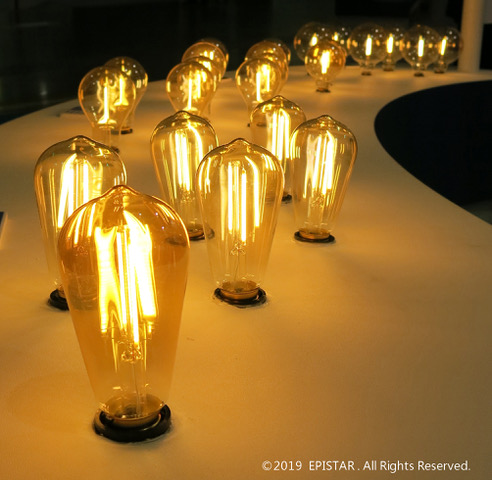Taiwan-based LED chip maker EPISTAR announced that it has received a remarkable ruling on LED filament bulbs in the patent litigation against Lowe’s. On February 11, 2020, the United States District Court for the Central District of California granted summary judgment of infringement against Lowe’s Home Center (Lowe’s).

(Image: EPISTAR)
The summary judgment order found that the accused Lowe’s LED bulbs infringed claims 1-3 and 8 of United States Patent No. 7,560,738 (’738 Patent), which is entitled “Light-Emitting Diode Array Having An Adhesive Layer.” The Court further denied Lowe’s invalidity motion with respect to claims 1-3 and 8 of the ’738 Patent. The Court’s finding of infringement confirms the value and importance of EPISTAR patent portfolio. EPISTAR believes that the infringement decision is one of the first decided by a U.S. court in the important field of LED filament bulb technology.
EPISTAR, a leading innovator and manufacturer of LED solid-state lighting technologies, had filed the patent infringement lawsuit against Lowe’s on April 28, 2017. In the lawsuit, EPISTAR asserted that certain LED filament bulbs sold by Lowe’s infringe multiple EPISTAR patents and sought injunctive relief to halt further sale of the infringing products. Specifically, the complaint asserts that, in addition to the ’738 Patent, the accused Lowe’s LED light bulbs infringe EPISTAR’s U.S. Patent Numbers 6,346,771 (’771 Patent), titled “High Power LED Lamp,” 8,492,780 (’780 Patent), titled “Light-Emitting Device And Manufacturing Method Thereof,” 8,587,020 (’020 Patent), titled “LED Lamp,” and 8,791,467 (“’467 Patent”), titled “Light Emitting Diode And Method Of Making The Same.”
EPISTAR patents protect the company's research and development efforts, and cover fundamental technologies for LED light bulbs. The company’s complaint against Lowe’s aims to protect EPISTAR’s efforts in research and development and to preserve its patent rights.
In addition to finding that the Lowe’s LED light bulbs infringe claims of the ’738 Patent, the District Court denied Lowes’ motions to invalidate the ’771 and ’780 Patents. Lowes did not file any invalidity motion against the ’020 Patent. The Court, however, did grant Lowes’ invalidity motion with respect to the ’467 Patent and claims 13-17 and 24 of the ’738 Patent.
As a result of the summary judgment decisions, EPISTAR expects that the trial on its patent infringement and damages claims against Lowe’s will occur in the Central District of California in 2020.





 CN
TW
EN
CN
TW
EN






